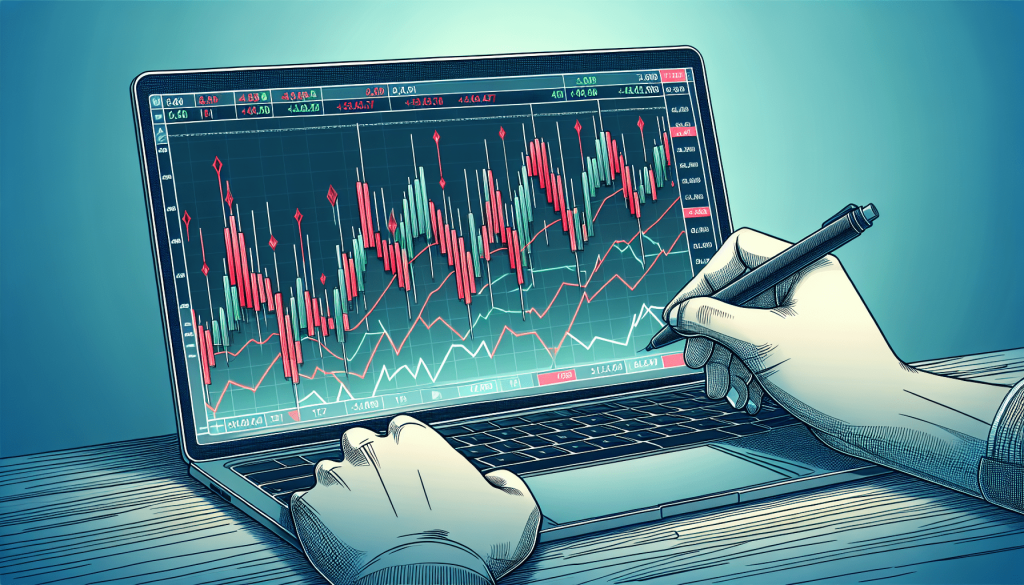
Imagine waking up in the morning, pouring yourself a cup of hot coffee and dipping your toes into the financial world, actively buying and selling stocks within the same day. This is the essence of day trading in financial markets, which offers a fascinating, albeit risky, avenue for individuals seeking to maximize their investment in a short period. This article guides you through the dynamic realm of day trading, delineating its intricacies, implications and strategies, providing invaluable insights to help you navigate this potentially lucrative endeavor.
Understanding Day Trading
Day trading is a buying and selling strategy in the financial market that involves holding and later selling financial instruments within the same trading day. The key goal of day trading is to profit from small price movements in highly liquid stocks, commodities, currencies, and other financial instruments.
Definition of Day Trading
Day trading refers to a style of financial trading where an investor buys and sells securities within a single trading day. Typically, all positions are closed before the market close of the trading day, with the aim of avoiding unmanageable losses caused by price gaps between one day’s close and the next’s open.
History and Evolution of Day Trading
The inception of day trading goes back to the “bucket shops” of the 1890s. However, it’s transformative evolution started during the 1990s when the internet era started and high-speed computers became more widespread. This provided regular people with access to financial information that was previously only available to brokers. Nowadays, with the advent of advanced technologies and the rise of online brokers, day trading has become increasingly popular among individual investors.
Day Trading vs. Long-Term Investing
Day trading and long-term investing are both effective strategies, but they differ primarily in terms of investment holding times and the strategies used. Day traders make multiple trades within a single day, profiting from short-term price movements, while long-term investors buy and hold securities for months or even years, hoping for long-term price appreciation and dividends.
Basic Principles of Day Trading
Day trading has its own set of rules and concepts that separate it from regular investing. Here, we will discuss the basics like leverage, market liquidity, and risk management.
The Concept of Leverage in Day Trading
Leverage in day trading refers to the use of borrowed funds to increase potential return on investment. Brokers provide this service, allowing traders to borrow money to buy more stocks than they could with their account balance alone. Traders need to manage leverage wisely as it also amplifies potential losses.
Understanding Market Liquidity
Market liquidity refers to the ability of an asset to be quickly bought or sold without causing a significant price change. For day traders, high liquidity is essential because it allows them to get in and out of positions quickly.
Risk Management Strategies
Risk management in day trading is crucial for survival in the long run. This could include setting stop losses, diversifying trades, and never risking more than a small percentage of your trading capital on a single trade.
Tools and Technologies for Day Traders
Modern day trading wouldn’t be possible without certain tools and technology. These are essential for performing actions like analysis, order execution, and monitoring market trends.
Trading Platforms and Software
Trading platforms and software offer the tools necessary for executing trades and managing positions. They also provide real-time quotes and news feeds, as well as technical analysis and charting tools.
Analytical and Charting Tools
These tools assist in the analysis of price movements and the prediction of future trends. They include various chart types and technical indicators, such as moving averages, relative strength index (RSI), and others.
The Role of High-Speed Internet
A fast and reliable internet connection is key for day trading. It can help avoid delay in order executions or updates on market trends which can significantly impact trading performance.
Popular Financial Instruments for Day Trading
Day traders have a wide range of financial instruments to trade. The most popular ones are stocks and equities, foreign exchange (Forex), cryptocurrencies, and futures and options.
Stocks and Equities
Stocks represent shares in a corporation, giving the owner a claim on part of the company’s assets and profits. Day traders often focus on highly liquid and volatile stocks to take advantage of their price movements.
Forex – Foreign Exchange Market
Forex trading involves the exchange of different currencies. The Forex market is the largest and most liquid market in the world, and it’s open 24 hours a day, five days a week, making it popular among day traders.
Cryptocurrencies and Digital Assets
Cryptocurrencies like Bitcoin and Ethereum are popular for day trading due to their extreme price volatility. However, the market can be risky, as prices can fluctuate extremely rapidly.
Futures and Options
Futures and options are types of financial derivatives that often draw in day traders. Futures contracts obligate the buyer to purchase an asset, while options contracts give the buyer the right, but not the obligation.
Strategies for Successful Day Trading
There are several strategies day traders employ in order to identify potential trading opportunities. These include technical analysis, fundamental analysis, and developing a trading plan.
Technical Analysis Techniques
Technical analysis involves using statistical trends derived from trading activity to identify opportunities. This includes patterns in price movements, volume, and rate of change.
Fundamental Analysis in Day Trading
Fundamental analysis involves analyzing financial, economic, and other qualitative and quantitative factors to evaluate a security’s intrinsic value. Day traders frequently use this method to predict how these elements can affect market trends.
Developing a Trading Plan
A good trading plan outlines the trader’s specific goals, risk tolerance levels, methodologies, evaluation criteria, and more. It is essential for decision-making and managing trades effectively.
Psychological Aspects of Day Trading
Day trading is a mentally demanding job. Success requires more than just knowledge and skills; a positive mindset and emotional control are very important.
Emotional Discipline and Control
Maintaining emotional discipline and control in day trading is crucial. It’s important to remain calm and composed, even in moments of high stress.
Dealing with Losses
Incurring losses is part and parcel of day trading. Learning to accept losses and recover from them instead of dwelling on them is key.
The Importance of Patience and Persistence
Patience and persistence are virtues in day trading. Successful traders are patient, waiting for the right opportunity rather than chasing trades, and are persistent, constantly learning and adjusting their strategies.
Day Trading Regulations and Legal Considerations
Understanding regulations is key to successful and legal operation in the financial market. Here are some important regulatory guidelines and legal considerations for day traders.
Understanding the Pattern Day Trader Rule
The Pattern Day Trader rule is a regulation that requires traders who execute four or more “day trades” within five business days to maintain a minimum account balance of $25,000.
Regulatory Bodies and Their Roles
Numerous regulatory bodies oversee trading to protect consumers, maintain fair markets and ensure financial stability. These include the Securities and Exchange Commission (SEC), Financial Industry Regulatory Authority (FINRA), Commodities Futures Trading Commission (CFTC), among others.
Compliance and Reporting Requirements
Day traders must comply with a variety of rules and regulations, including reporting requirements. Failure to do so can have serious legal and financial consequences.
Challenges and Risks of Day Trading
Day trading has its challenges and risks, and understanding these issues can help you better decide if this career path is right for you.
Volatility and Market Dynamics
Markets can be unpredictable and volatile, which can cause substantial losses. Understanding market dynamics like these trends is crucial for success in day trading.
Overleveraging and its Dangers
Overleveraging refers to taking on too much risk by borrowing too much money to trade. While it can amplify profits, it can also amplify losses, leading to a complete wipeout of trading capital.
The Impact of Transaction Costs
Day traders tend to make a lot of trades, which can result in high transaction costs. These costs can eat into profits and make profitable trading much more challenging.
Educational Resources for Day Traders
As part of your journey to becoming a successful day trader, you should leverage numerous educational resources to enhance your skills and knowledge.
Books and Ebooks
Books and ebooks offer the chance to learn from experts in the field. They cover a wide selection of topics including strategies, market analysis techniques, psychology, and more.
Online Courses and Webinars
Online courses and webinars provide interactive and in-depth learning experience. They often cover specific strategies and offer real-time trading examples.
Mentorship and Coaching Programs
These programs provide personalized guidance, allowing you to learn from a professional trader. They often involve evaluating your trading strategies and providing constructive feedback.
Preparing for a Career in Day Trading
Day trading as a career needs preparation. Here’s what you should consider while preparing for it.
Required Skills and Qualifications
Apart from understanding the market and trading techniques, traits like discipline, patience, objectivity, and a keen interest in learning can help you become a successful day trader.
Building a Day Trading Setup
A good trading setup with a reliable computer, multiple monitors and a fast, stable internet connection can boost your day trading performance significantly.
Creating a Network and Community Involvement
Joining day trading communities can help in gaining insights, learning from the experiences of others, and staying updated with market trends and news.
In conclusion, day trading could potentially bring good profits but also significant risks that warrant understanding and preparation. Once you master the art of day trading, it can be a rewarding and exciting career.





